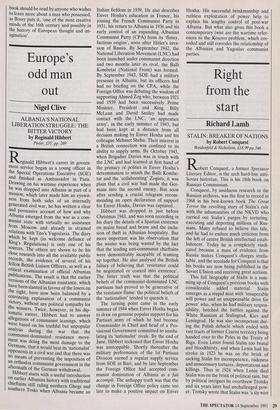Europe's odd man out
Nigel Clive
ALBANIA'S NATIONAL LIBERATION STRUGGLE: THE BITTER VICTORY by Reginald Hibbert
Pinter, £35, pp. 269
Reginald Hibbert's career in govern- ment service began as a young officer in the Special Operations Executive (SOE) and finished as Ambassador in Paris. Drawing on his wartime experience when he was dropped into Albania as part of a mission, which later made him an eyewit- ness from both sides of an internally generated civil war, he has written a clear and persuasive account of how and why Albania emerged from the war as a com- munist state with virtually no assistance from Moscow and already in strained relations with Tito's Yugoslavia. The diary which he kept (in welcome defiance of King's Regulations) is only one of his sources. The others are shown to be his close research into all the available public records, the evidence of several of his fellow British Liaison Officers, as well as a critical examination of official Albanian publications. The result is that the earlier versions of the Albanian resistance, which have been slanted in favour of the losers on the right, have now been balanced by a convincing explanation of a communist victory, without any political sympathy for the winners. Twice, however, in his dip- lomatic career, Hibbert had to answer allegations of communist leanings, which were based on his truthful but unpopular analysis during the war that the communist-dominated resistance move- ment was doing the most damage to the Germans, that it would beat its 'nationalist' Opponents in a civil war and that there was no means of preventing the imposition of an orthodox communist government in the aftermath of the German withdrawal. Hibbert starts with a useful introduction on earlier Albanian history with traditional chieftains still ruling northern Ghegs and southern Tosks when Albania became an Italian fiefdom in 1939. He also describes Enver Hoxha's education in France, his joining the French Communist Party in 1931, his return to Albania in 1936 and his early control of an expanding Albanian Communist Party (CPA) from its 'flimsy, factious origins', soon after Hitler's inva- sion of Russia. By September 1942, the National Liberation Movement (LNC) had been launched under communist direction and two months later its rival, the Balli Kombetar (National Front) was formed. By September 1943, SOE had a military presence in Albania, but its officers had had no briefing on the CPA, while the Foreign Office was debating the wisdom of supporting Ahmed Zog who, between 1921 and 1939 had been successively Prime Minister, President and King. Billy McLean and David Smiley had made contact with the LNC, 'an apprentice army', in the early summer of 1943, but had been kept at a distance from all decision making by Enver Hoxha and his colleague Mehmet Shehu. Their interest in a British connection was confined to its ability to supply arms. By October 1943, when Brigadier Davies was in touch with the LNC and had learned at first hand of the primacy of politics in Enver Hoxha's determination to smash the Balli Kombe- tar and the `collaborating' Zogists, it was plain that a civil war had made the Ger- mans into the second enemy. But soon after sending a crucial telegram recom- mending an open declaration of support for Enver Hoxha, Davies was captured.
Hibbert was dropped in just before Christmas 1943, and was soon recording in his diary the details of a Spartan existence on maize bread and beans and the inclu- sion of theft in Albanian hospitality. But more important was his observation that the winter was being wasted by the fact that the leading anti-communist chieftains were demonstrably incapable of teaming up together. He also analysed the British fallacy of believing that 'resistance could be negotiated or coaxed into existence'. The bitter truth was that the political beliefs of the communist-dominated LNC partisans had proved to be generative of the resistance flame: the political beliefs of the 'nationalists' tended to quench it.
The turning point came in the early summer of 1944 when Enver Hoxha began to draw on genuine popular support for his Partisan army of which he had become Commander in Chief and head of a Pro- visional Government committed to annihi- lating its `nationalist' rivals. By the end of June, Hibbert reckoned that Enver Hoxha was unstoppable. Shortly thereafter the military performance of the 1st Partisan Division earned a regular supply service from SOE in Bari, and by late September the Foreign Office had accepted com- munist domination of Albania as a fait accompli. The unhappy truth was that the change in Foreign Office policy came too late to make a positive impact on Enver Hoxha. His successful brinkmanship and ruthless exploitation of power help to explain his lengthy control of post-war Albania. But what also gives this book a contemporary twist are the wartime refer- ences to the Kosovo problem, which cor- roded and still corrodes the relationship of the Albanian and Yugoslav communist parties.


















































 Previous page
Previous page